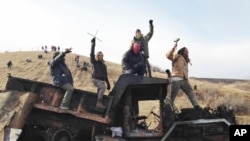A government order for protesters of the Dakota Access pipeline to leave federal land could have little immediate effect on the encampment where scores of people have been gathered for months to oppose the $3.8 billion project.
A North Dakota sheriff on Monday dismissed the deadline as a meaningless move aimed only at reducing the government's legal responsibility for hundreds of demonstrators.
The Army Corps of Engineers “is basically kicking the can down the road, and all it is doing is taking the liability from the Corps and putting it on” the Standing Rock Sioux tribe, Morton County Sheriff Kyle Kirchmeier said.
The Corps said last week in a letter that all federal lands north of the Cannonball River will be closed to the public for “safety concerns” starting Dec. 5. The order includes the encampment called Oceti Sakowin, or Seven Council Fires camp.
The agency cited North Dakota's oncoming winter and increasingly contentious clashes between protesters and police.
But in a statement issued late Sunday, the Corps said it “has no plans for forcible removal.” Anyone on land north of the river, including the main protest camp, after the deadline may be prosecuted for trespassing.
Gov. Jack Dalrymple called the Corps' position “very puzzling.”
“When you put out a pronouncement that people must leave your land by a certain date, I think you take on a responsibility to somehow bring that about,” Dalrymple said. “Clearly the responsibility of clearing that land now lies primarily with the Corps.”
Later on Monday, Dalrymple ordered a “mandatory evacuation” for the camp “to safeguard against harsh winter conditions.” But the order didn't specify any action to be taken against protesters who don't comply, and state Emergency Services spokeswoman Cecily Fong later said no action would be taken to enforce it.
The 1,172-mile pipeline is nearly complete except for a small section beneath a Missouri River reservoir near the encampment, which is about 50 miles south of Bismarck.
Opponents, who call themselves “water protectors,” worry about potential effects on drinking water on the Standing Rock Sioux reservation and farther downstream on the Missouri River, as well as destruction of cultural artifacts, including burial sites. They also believe the land near the confluence of the Missouri and Cannonball rivers is still rightfully owned by the Standing Rock Sioux under a nearly 150-year-old treaty.
County and state officials have been seeking federal law enforcement help for months and were initially buoyed by the Corps' order for protesters to move off the land. The agency's later announcement that it would not forcibly evict any demonstrators dampened hopes that the issue would soon be resolved, Morton County Commission Chairman Cody Schulz said.
“It's useless for local and state law enforcement, and the order from the Corps is self-serving and amounts to them limiting their liability,” Schulz said.
The sheriff said state and local officials lack jurisdiction to remove the protesters.
“This is a federal problem and needs to be dealt with by them,” Kirchmeier said.
During a news conference Saturday at the camp, protest organizers said they will not leave or stop their acts of civil disobedience.
Standing Rock Sioux tribal leader Dave Archambault did not immediately return telephone calls on Monday.
North Dakota's notoriously brutal winters may help empty the camp of protesters, many of them who are from out of state, Kirchmeier said.
“That's what I'm hoping, or at least cut the number of them,” he added.
Much of the state, including the encampment, was getting hit with the first big winter storm of the year Monday, as heavy snow and strong winds pounded the area.
The sheriff said snowplow crews were working to clear roads throughout the county, but about a mile of a state highway leading to the encampment was being left unplowed.
“Workers do not feel safe there,” he said.







